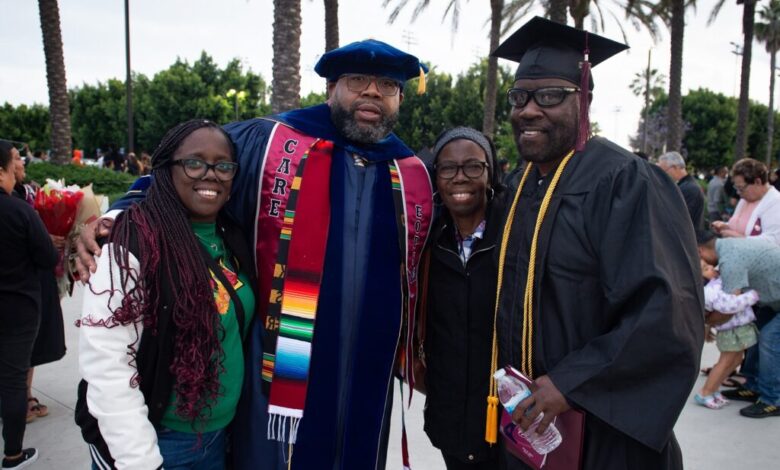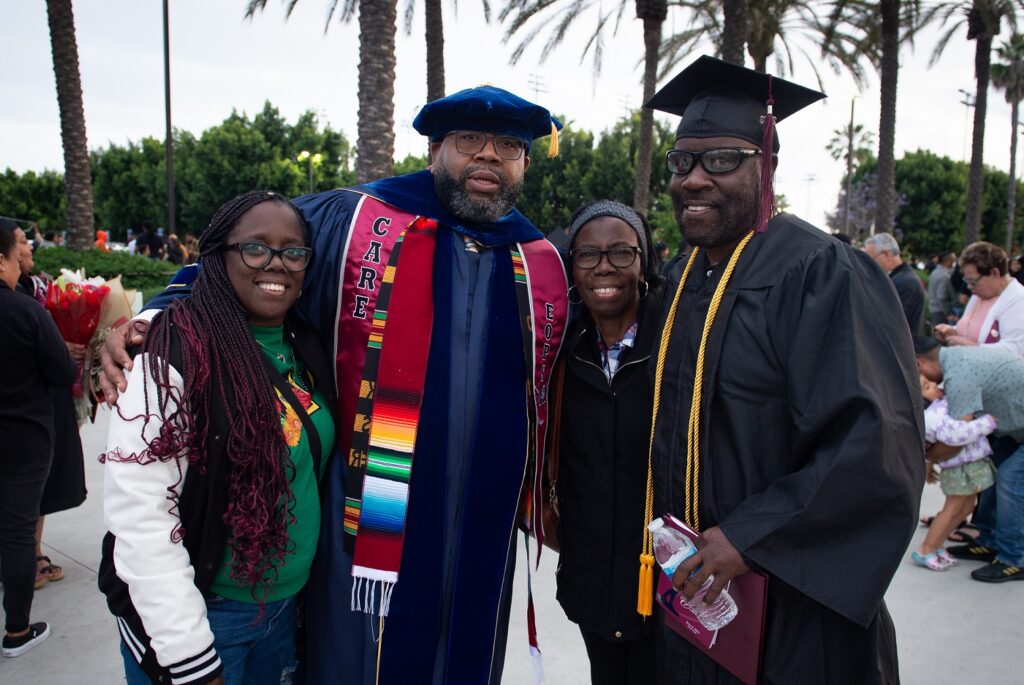Unapologetically building opportunities for Black student success


Compton Community College District CEO Keith Curry, second from the left, celebrated Compton College’s commencement ceremony on June 9 with students and family.
Courtesy: Compton Community College District
We must do more to nurture and ensure Black student success, not just at Compton College, but across the state, the country and through many levels of higher education — from associate to bachelor’s degrees and beyond. This includes guiding our students to enroll in college and graduate, pursue further education and/or a career, and then fighting to remove the many obstacles Black students face in their educational journey.
The financial impact of Black students not completing associate degrees or certificate programs at community colleges or bachelor’s degrees is concerning. We want to ensure Black learners benefit financially from the so-called American dream, including wealth generation and competing in this economy.
One influential program that focuses on the needs of Black students at California’s community colleges is Black Student Success Week, which takes place at the end of April every year. In the past four years, we have advocated for increased college affordability for Black students, intentional funding for Black student success, and making dedicated spaces for Black students to thrive at California colleges and universities. During Black Student Success Week, students and practitioners have a chance to connect. Webinars focus on critical aspects of the Black student experience, such as building racially equitable state policy, transitioning students to the workforce and livable wages, and creating programs supporting Black student success.
I am also proud to lead Level UP and Get Real, a national group dedicated to improving policies and practices in American postsecondary education so that Black learners can overcome obstacles such as systemic racism, oppression and racial wealth disparity. This dynamic group works to ensure students have access to a college education and the support they need to become successful learners and leaders.
At the college level, hands-on learning is an essential part of a student’s education. Students need to be able to put what they have learned into practice and see where they are headed — to envision their future. This is why on-site career exploration, field trips and similar experiences are valuable. Many California community college campuses already offer a variety of transfer programs where students can visit four-year colleges and universities, meet with admission representatives, and participate in panels featuring current students. Certain California community college campuses can only sponsor these visits due to California Assembly Bill 1887, which prohibits state-funded travel to other states with discriminatory laws. While this law was designed to promote fairness and equality and combat discrimination, it also hinders Black students from visiting and enrolling at historically Black colleges and universities because many of those institutions are in states on the travel ban list. To address this, the Compton Community College District board of trustees approved a resolution that gives the President/CEO authority to approve out-of-state travel for educational purposes to states on the travel ban list.
However, many students don’t have the resources to travel and tour these schools alone or with their families. Black students need opportunities designed explicitly to learn about transfer options and get a good idea of what it is like to be in a university setting. To provide these, Compton College offers out-of-state transfer exploration programs, including tours of historically Black colleges and universities, a summer residential program at Clark Atlanta University (a historically black research institution) and, we are also working with Charles R. Drew University of Medicine and Science (another HBCU) on a three-year bachelor’s degree program that will start this fall.
HBCUs provide culturally responsive, racially sensitive environments where Black students can fully and confidently engage in their education. Research shows that HBCUs boast higher graduation rates for students from low socioeconomic backgrounds and with less college preparedness. We need to make it easier for students to transfer to these institutions. California Assembly Bill 1400 would support community college transfer students attending an HBCU by refocusing underused funds generated by the College Access Tax Credit to provide substantive one-time awards for up to $5,000 under the Community College Transfer Guarantee Pathway to HBCUs program. California only has one Historically Black Graduate Institution (HBGI), Charles R. Drew University of Medicine and Science, and zero HBCU’s, so many California community college students transferring to HBCU institutions outside the state do not receive state-based aid. Unlike programs such as the California Chafee Grant for Foster Youth, which current or former foster youth can utilize at out-of-state institutions, Black students in California are not supported in seeking the campus experience and benefits an HBCU can provide.
A college education is an excellent start toward Black student success. Decades of studies show Black students face persistent social and economic barriers resulting in overall lower academic performance and educational attainment than their peers.
This month, we celebrated graduation and the success of our students. These conversations on Black student success must continue as we unapologetically fight for these students throughout higher education. With a college education, students can rise above the long-term effects of lower income and achieve professional stability and growth opportunities. Our students — especially our Black students — deserve equitable, personalized pathways to a bright future, and that’s worth fighting for today.
•••
Keith Curry, Ed.D., is the president/CEO of Compton Community College District.
The opinions expressed in this commentary represent those of the author. EdSource welcomes commentaries representing diverse points of view. If you would like to submit a commentary, please review our guidelines and contact us.



